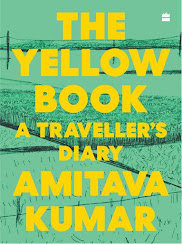New Delhi, (Asian independent) He calls it a happy accident. Author Amitava Kumar had already finished work on ‘The Blue Book: A Writer’s Journal’, but had not stopped drawing or keeping a journal.
One day, his colleague at Vassar College in the US asked him to visit his class on creativity. The colleague had given his students two journals joined together with a thick rubber band: one was blue and it was meant for writing down one’s thoughts, while the other, which was yellow, was for writing other people’s words.
“He gave me the same bound journals as a gift too. I immediately told the class that I had found the title I would give to the sequel,” says Kumar, whose latest ‘The Yellow Book: A Traveller’s Diary’, published by HarperCollins India recently hit the stands.
In his latest, the author allows the reader to see how a writer observes the world.
There are entries — the death of the legendary writer and journalist Joan Didion, the rituals he wants his students on a study tour to follow in London, like taking a picture of the first coffee, going for a run…artist Krishen Khanna’s painting on Gandhi’s death…notes from his visit to his hometown (Motihari) in India.
Again, the book is a journal.. allowing all the multiple possibilities in its reading. From the attack on Rushdie to Russia’s invasion of Ukraine, the writer, with his words and artwork, continues making notes, stressing the need to mark memories and to keep believing.
He says the practice of keeping a journal has been hugely important for his work and that he uses his old ones as material all the time.
“I always like to quote a friend who has written that if journalism is the first rough draft of history, then perhaps a journal is the first rough draft of literature,” Kumar says.
Like many writers, Kumar has always stressed on the need to write every day. He however stresses the need to walk meditatively for ten minutes each day, imagining that with every step they take they are planting lotuses with their feet.
“I learned this from a lecture given by the Buddhist teacher, Thich Nhat Hanh. It is a way of cultivating mindfulness. It is also a way of exercising, of course, and of freeing the mind to come up with new ideas,” he says.
The author feels that to travel is to leave behind what is familiar or comforting or stale, taking one out of himself and forcing him to encounter the world.
“It doesn’t mean that you abandon your interiority or your private thoughts: it’s just that you see yourself against a new background,” he adds.
But for a writer like him, who undertook the journey from Bihar to the US and has also written on the immigrant experience — does the immigrant ever stop travelling, even after he has lived in his new country for a long time? The author feels that everything, even what is new, can often quickly become a habit or a part of a routine.
“Let’s say you have gone to a new city, you step out of your hotel room each day to go to the same cafe, and after a while, you recognise the waiter and he recognises you, and maybe you start thinking of yourself as a regular. In a narrow sense, you stop being a traveller. It is the same with an immigrant, the sense of having a home and a bed that is yours even though you have left the home where you grew up. I should add that I draw to pay attention. To break out of routine, to pay attention, to see with new eyes.”
For someone who wrote ‘A Time Outside This Time’, a novel about fake news, memory, and how truth gives over to fiction, news should never be consumed passively.
“It was never right to do it and it is especially dangerous to do so now,” concludes Kumar, who is currently working on the last of the trilogy of drawing books: ‘The Green Book: A Citizen’s Report’.
The set of drawings in his next are primarily focused on the environment and climate change and will be published by HarperCollins India at the end of this year.









